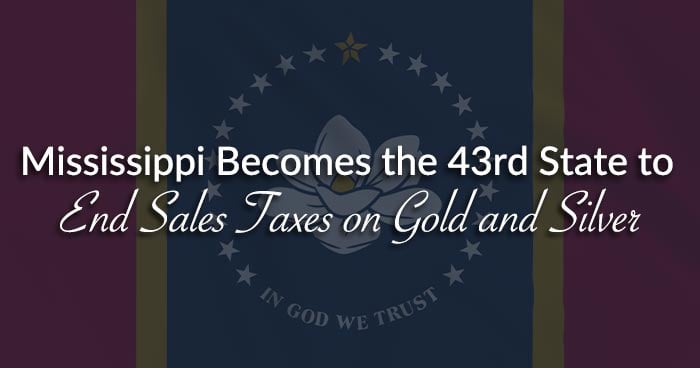(Jackson, Mississippi) – With the stroke of Gov. Tate Reeves's pen on Wednesday, Mississippi has become the 43rd state in the country to end sales taxes on the purchase of physical gold, silver, platinum, and palladium coins and bullion.
Senate Bill 2862, sponsored by Sen. Juan Barnett (D-34), had passed out of the full Senate by a vote of 52-0 and sailed through the House of Representatives by a vote of 115-0. The effective date is July 1, 2023.
Backed by the Sound Money Defense League, Money Metals Exchange, and in-state Mississippi dealers and investors, this year's legislative effort is built upon a multi-year grassroots campaign waged by sound money activists. Other key supporters in the Mississippi legislature included Rep. Jody Steverson (R-4), Rep. Jill Ford (R-73), and Sen. Chad McMahan (R-6).
Taxing all precious metals purchases has become an outmoded and even controversial practice in the United States. Only seven states still engage in it.
Every one of Mississippi's neighbors (Alabama, Louisiana, Kentucky, and Tennessee) had already stopped taxing the monetary metals. Most recently, Tennessee ended this tax in 2022, and Arkansas and Ohio eliminated this tax in 2021. And additional states may pass their exemptions this year.
The Mississippi sales tax on gold and silver had discouraged citizens from protecting their savings against the devaluation of the dollar – or driving them to look for out-of-state options.
Eliminating sales taxes on gold, silver, and other precious metals is good public policy for several reasons:
- Levying sales taxes on gold and silver is inappropriate. Sales taxes are typically levied on final consumer goods. Computers, shirts, and shoes carry sales taxes because the consumer is "consuming" the good. Precious metals are inherently held for resale, not "consumption," making the application of sales taxes on precious metals inappropriate.
- Studies have shown that taxing precious metals is an inefficient form of revenue collection. The results of one study involving Michigan show that any sales tax proceeds a state collects on precious metals are likely surpassed by the state revenue lost from conventions, businesses, and economic activity that are driven out of the state.
- Taxing gold and silver harms in-state businesses. It's a competitive marketplace, so buyers will take their business to neighboring states, such as Alabama or Louisiana (which have eliminated or reduced sales tax on precious metals), thereby undermining Mississippi jobs. Levying sales tax on precious metals harms in-state businesses that will lose business to out-of-state precious metals dealers. Investors can easily avoid paying $136.50 in sales taxes, for example, on a $1,950 purchase of a one-ounce gold bar.
- Taxing precious metals is unfair to certain savers and investors. Gold and silver are held as forms of savings and investment. Mississippi does not tax the purchase of stocks, bonds, ETFs, currencies, and other financial instruments.
- Taxing precious metals is harmful to citizens attempting to protect their assets. Purchasers of precious metals aren't fat-cat investors. Most who buy precious metals do so in small increments as a way of saving money. Precious metals investors are purchasing precious metals as a way to preserve their wealth against the damages of inflation. Inflation harms the poorest among us, including pensioners, Mississippians on fixed incomes, wage earners, savers, and more.
Only seven states (New Mexico, Hawaii, Wisconsin, Kentucky, Maine, New Jersey, and Vermont) still participate in the outmoded practice of taxing purchases of constitutional sound money. Of these seven outliers, legislative allies in five states introduced sales tax exemption bills, with efforts in Wisconsin, New Jersey, and Maine still ongoing.
Related bills to restore sound, constitutional money have also been introduced this year in Alaska, Iowa, West Virginia, South Carolina, Missouri, Minnesota, Tennessee, Montana, Idaho, Wyoming, Kansas, and more.
Currently, Mississippi is tied for 45th out of 50 in the 2023 Sound Money Index. The passage of this measure will increase the state's ranking dramatically.





